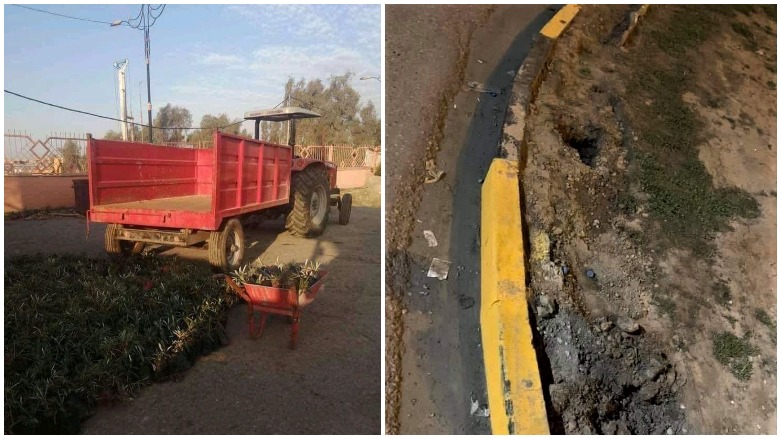Mosul officials backtrack after removing trees planted for pope's visit

By Halgurd Sherwani and Joanne Stocker-Kelly
ERBIL (Kurdistan 24) – Following an outcry by residents, the local administration in Iraq’s northern city of Mosul quickly reversed its decision to remove trees and other greenery planted in some neighborhoods just before Pope Francis visited there on Sunday.
The news of the pontiff’s planned visit to Iraq led to a rush of roadwork and other improvements to the capital Baghdad as well as Mosul and Nasiriyah by provincial governments, long criticized for not delivering basic services and maintaining infrastructure.
Iraqis mockingly reacted to the rapidly delivered services with social media posts asking Francis to drive through their areas, so they too could attract government investment.
"I ask the Pope to go around the hospitals, their bathrooms and their emergency rooms -- maybe they'll clean them," one woman, Layal al-Qudsi, wrote on Facebook, as reported by AFP
“Can you please stay in Iraq for 5 years so the government fixes all the streets as whenever you leave the streets will go back to their old state,” another tweeted.
Following an initial visit to the Kurdistan Region’s capital of Erbil, the pope flew by helicopter to nearby Mosul, where he prayed for the victims of war at the ruins of the Syriac Catholic Church of the Immaculate Conception (al-Tahira-l-Kubra) in the Mosul’s largely-destroyed neighborhood known as the Old Town.
He also took a tour by golf cart around the often rubble-filled streets of Mosul, where he witnessed up close the ruins of war and municipal negligence of the area.
Read More: Christian exodus from Iraq, Middle East does ‘incalculable harm,’ pope says in Mosul
The trees were planted as part of a last-minute beautification plan to welcome Francis to the ancient part of the city, much of which was damaged by airstrikes in the battle against the Islamic State. The city has been slow to rebuild, and the new plantings were a welcome sight for many city residents.
By Monday afternoon, however, just hours after Francis’ plane took off from Baghdad for Rome, images circulated on Twitter of the very same trees and other plants being uprooted and carted away by tractor.
The removal immediately resulted in a social media outcry.
By Tuesday afternoon, Ninevah Governor Najm al-Jubouri had apologized and at least some of the trees were back, leaving further questions as to where they had gone during their brief sojourn.
City workers replanted them, “as we, Mosuli social media bloggers, posed a huge pressure on the authorities,” said Ali Y. Al-Baroodi, a university teacher and photo blogger.
The government claimed the decision to remove the plantings was taken by a low-level employee, Baroodi said, but the debacle and the reaction by authorities to the pope’s visit itself highlights lingering dissatisfaction among the city’s residents over the government’s apparent failure to prioritize areas outside the capital for reconstruction.
Three years after Mosul was recaptured from the Islamic State by Iraqi security forces and the US-led Coalition, much of the city still bears the scars of devastating war.
“The reconstruction is going so tediously slow [due to] lack of funds and compensations,” Baroodi told Kurdistan 24 English on Wednesday.
The Baghdad government is “not dealing with [Mosul] as a war-stricken area,” he said, but “as if nothing happened here.”
Rasha Al Aqeedi, a Senior Analyst at the Washington, DC-based Newlines Institute, who spent much of her life in Mosul, said it was a moral defeat for the Islamic State that Francis visited and prayed at the place where the extremist group’s leader Abu Bakr al-Baghdadi had first declared the formation of his so-called caliphate, some seven years earlier.
“It’s another form of humiliation for whatever remains of the Islamic State,” she told Kurdistan 24, for the group to claim for years that it would take the “caliphate” to Rome only to have Rome instead come to Mosul and pray.
Al Aqeedi said it was people, not the government, who had assumed responsibility for building much of the Old Town, while other neighborhoods have begun to recover. The budget simply isn’t there to rebuild Mosul, she said: “There’s financial restriction, there’s a lot of marginalization where Mosul doesn’t even count.”
Despite the pomp around the pope’s visit, she added, people’s lives won’t change.
“I hope… there’s a better understanding of the devastation and destruction still in the Old Town, which is obviously very historic, and is a crosspoint between Christianity and Islam,” Al Aqeedi said. “The government had three years to fix this and it did not. I hope that sheds some light on how much Mosul is lacking and how much injustice has been done to Mosul.”
Additional reporting by Joanne Stocker-Kelly
Editing by John J. Catherine
